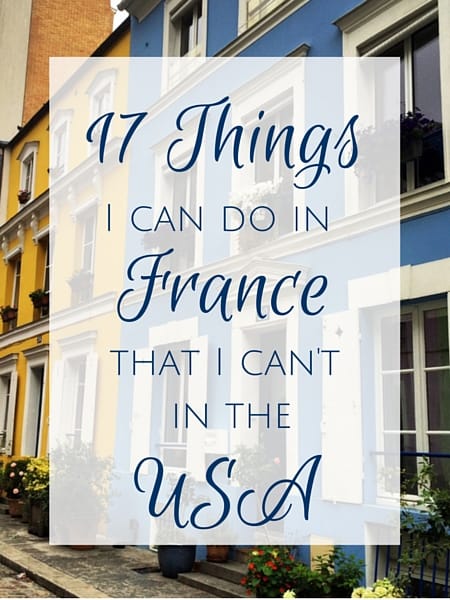I’ve lived in France since 2012 and I’ve had a lot of time over the years to reflect on the French way of life and how it differs from how we do things in the U.S. Usually here on the blog, I try to provide information and keep my opinions out of it for the most part, but not today. Some opinions are coming right at you! Here are seven things I feel France does better than the United States.
7 Things France does better than the U.S.
1. Wine/bread/cheese
Everyone knows France does food right. Period. French wine, bread and cheese are amazing! You’ll find some of the best in the world in France. Speaking of wine specifically, you can buy it directly from the producer and it’s affordable. You can even find good wines at the supermarket for under 10 euros/bottle. Or go on a road trip. There are wineries all over the country that you can visit.
On top of that, the bread in France is phenomenal and there are bakeries seemingly on every corner. They all make pretty darn good bread. Once you try authentic French bread in France, you can’t go back to eating anything else. And there’s not just baguettes but all kinds of different breads and pastries you can try.
Let’s not forget about the cheese. It’s also affordable and a must after every meal. What can I say? France gets wine, bread, and cheese right!
77 Little differences about life in France >>
2. Higher education costs
It costs a fortune to go to college in the U.S. these days and many students can’t afford it at all, let alone their school of choice. In fact, according to Federal Student Loan Portfolio, they report that as of June 2023, the average federal student loan debt in the U.S. was about $37,650. Also in June 2023, the total federal student loan debt balance was just over $1.63 trillion.
To give you an idea of college costs, I had a look at US News & World Reports. The average cost of tuition and fees to attend a ranked private university for the 2023-24 school year is $42,162. For one year. Without housing.
And don’t even get me started on the debt medical professionals get into. Many doctors graduate with student loan debt well into the six figures that can take decades to pay off. Higher education shouldn’t be cost prohibitive! France seems to understand that.
For many of us in the United States, depending on where we went to high school, the only option was a 4-year university if you were on that track. But in France, trade and technical schools are common. Two-year degrees are also very regular things to pursue in order to prepare yourself for a particular career.
In France, the government subsidizes tuition fees so the average public university in France charges €170 per year for a bachelor’s degree, €243 for a master’s degree, €380 for a PhD and €601 to attend an engineering school. For international undergraduate students, the fees would be a little more, heavily subsidized though still, at €2,770 euros per year, €3,770 for postgraduate study.
Private schools are higher but nowhere near what they are in the U.S. Students graduating without debt is a good thing. Way to go France!
3. Affordable healthcare
In France, healthcare is a basic human right afforded to all and not a privilege or benefit of working for a good employer. In fact, in France if you lose your job, you and your family don’t lose healthcare coverage along with it. Dental care too. Prices of different services and treatments are clearly posted in the doctors’ waiting rooms so you know what you’re going to pay ahead of time.
Isn’t that the way it should be everywhere in the world? Healthcare is such a basic human right, but in the U.S. many people are uninsured or underinsured. Healthcare costs — including medication costs — in the U.S. are exorbitant.
The WSJ writes, “Access to health care appears to have produced a healthier nation. France’s infant death rate is 3.9 per 1,000 live births, compared with seven per 1,000 in the U.S. The country has more hospital beds and doctors per capita than the U.S., and a markedly lower rate of mortality from respiratory disease. And France spends less (10.7% of gross domestic product) on health care than the U.S. (16% of GDP).”
Hmmm, France seems to be doing something right. Now of course French healthcare isn’t without its shortcomings, no system is perfect, but it’s nice to know an accident or serious health diagnosis isn’t going to bankrupt you. And that gives me peace of mind.
On the topic of healthcare, I’d be remiss if I didn’t mention French pharmacies. They are fantastic, and to learn more about them, I made a behind-the-scenes video at a French pharmacy that you can watch to gain a better understanding.
Myths about French healthcare you should stop believing >>
4. Gun laws
Yes, guns exist in France but know what doesn’t? People obsessed with their guns. There’s no gun culture. There’s no open and concealed carry. I don’t fear being shot when walking around in France because people don’t have guns on them.
Can a private citizen own a gun in France? Yes, but it’s a pretty in-depth process. Its intended use is at the shooting range and aside from that, a personal weapon needs to be locked in a gun safe. You’ll also need a medical certificate, a home safe, and a valid shooting license (that you do at the range, which takes time). That’s all required before you can apply to get a weapons permit and this is the case nationwide.
In France, a gun isn’t for personal protection or a symbol of one’s freedom — it’s for sport shooting — and you can’t walk around with a gun in public regardless (hunting would be an exception).
On top of that, maybe more importantly, the vast majority of French people have no desire to own a weapon or pursue any type of shooting license. It just isn’t a thing.
For me, it comes down to this. There are six times more guns in the U.S. than France, and sure the population is bigger, but the rate of firearm homicide per 100,000 people is 4.52 in the U.S. and 0.24 in France. Enough said.
9 MAJOR things people overlook when moving to France >>
5. Public transportation
France is a much smaller country than the U.S. and I have to say that France’s public transportation is a major plus. From high speed trains, the TGV (train à grande vitesse), to tramways and buses and metro networks, you can get around France without driving or flying pretty easily.
In fact, France has 27,483 kilometers of railway lines (only second to Germany) making train travel in France a very popular option for good reason. It’s often affordable as well. I wrote a guide to train travel in France (including where to buy tickets so you don’t get ripped off).
6. Maternity leave
Maternity leave in France is a minimum of 16 weeks long. Soon-to-be mothers are entitled to 16 weeks off work with pay, which breaks down to six weeks before birth and another 10 after. It’s longer if you have twins, if there are complications, or if it’s your third child.
Something I found interesting is that maternity leave is obligatory. It is strictly forbidden to not take it… so much so that the employer may be fined up to €1,500 if a pregnant person does not comply and tries to work during this time!
Turning to paternity leave, it breaks down as follows: Four days of mandatory leave right after the birth and then 21 additional days within the next six months. Adoptive parents also get leave (a little bit shorter though). Remember, this amount of paid leave is what’s given by law and is not a perk of working for a great company.
In the U.S., it might surprise you to know that companies are under no legal obligation to offer paid parental leave or any leave at all, although good companies do and package it as a benefit. The Family Medical Leave Act (FMLA) covers up to 12 weeks of unpaid leave but is only an option for those who work at a company with at least 50 employees.
France is not the unicorn. It’s the U.S. that’s the outlier. Most civilized countries offer paid maternity leave. France wins here and I say this as someone who is child-free. I have no horse in this race. But it’s nice to know that France gives people the time they need before expecting them to be back at work.
7. Work-life balance including 5 weeks of paid vacation time
People in France — and I’d wager many countries around the world — work to live and not the other way around. All full-time employees get five weeks of paid vacation per year that they’re expected to take (plus public holidays). Work isn’t the most important thing in people’s lives and it’s not so entwined with people’s identities.
It’s not a badge of honor to say you were in the office until midnight or made an extra $1000 working overtime.
Rest time is important too, so much so that most stores are closed on Sundays and after 8 p.m., sometimes earlier in small towns. Some places like banks are even closed during lunchtime. My bank is closed from 12-2. You’ll even find that some stores and places of business, like my bank, are closed all day on Mondays as well if they have Saturday hours.
This is all to say that the French lifestyle prioritizes rest, vacation, family time over pretty much everything else. They even have a word for people who vacation in July and August. Here are some reasons why I love living in France.
***
Let me close by mentioning something extremely important. Not everyone’s experience in France, or the U.S., or anywhere in the world is going to be the same. Regional differences count for a lot and one’s job and financial status and all kinds of things have an impact on what our lives are like.
I also want to point out that just because there are a lot of great aspects of life in France, it doesn’t mean by default that everything sucks in the U.S. That’s not the case at all. As I always say, life is nuanced and different things are important to different people depending on our circumstances.
In the name of balance, stay tuned for the reverse post on what things the U.S. does better than France. Also, I have a Francophile holiday gift guide now live that I’d love for you to check out. They’re all quality gifts that I either own or have tried over the years.
Thank you and see you back here on Oui In France soon!









Great article. Thank you for talking about the gun laws in France along with public transportation in that country.
You’re very welcome. Thank you for reading!
Hello Diane:
Well let me start by saying I absolutely love France. My wife is Cuban-French, my mother in law French, and our children of course have US and French nationalities.
We have been to France many times, and it is a place I look forward to retire, since as you well point out, is a country with a great live style.
However, as true as all you point out is, you can’t overlook the fact that must of the benefits you mention come out from the taxes every French citizen pays. In addition, salaries are way lower in France that in the US. For example, an average salary of a doctor in Paris is about 75% less than the same in a city like Miami, Fl, where I live. Yes medical schools in the US are very expensive, yet they have financial aid packages available to almost all students, therefore after graduating, most doctors are able to pay off the debt pretty quick.
The US offers ways to move up socially much better than Europe. Any immigrant can achieve a pretty decent live style in the US, whether in France, if one does not have property inherited, or what we call generational wealth, it is a different story.
In the end, nothing is perfect.
Exactly, nowhere is perfect so it really comes down to what is most important to people in life.
I moved to France with no inherited wealth and through education moved up socially, got a bigger house, became French etc and am very happy to pay higher taxes for better social services and work-life balance. I would never move to the US where success through hard work is by no means guaranteed and you have little time to enjoy it. And I won’t talk about the shootings! I guess it’s all about choice and what you’re looking for in life. Anyway, great article. Thanks!
Glad you enjoyed it, Mark, and I’m of the same mindset as you. Paying higher taxes that benefit society as a whole and where you get something in return makes sense. What people forget is that the French have a great work/life balance and lifestyle in general because certain systems are in place that allow for that. I’m 100% on board.
Overall a good article, enjoyed it. Yet I must quiry you on your complete omission of French butter. How could you? I’m so sad. It makes me think you really don’t love people.
Hahhahaha
I agree with everything you’ve shared here… and I want to underline how tragic it is that you can’t get the same quality of cheese in the US. I think that’s the thing that I miss most when I’m home. I’ve been trying to figure out how to convert my wine suitcase into a cheese suitcase, lol.
” Once you try authentic French bread in France, you can’t go back to eating anything else.” : so true!